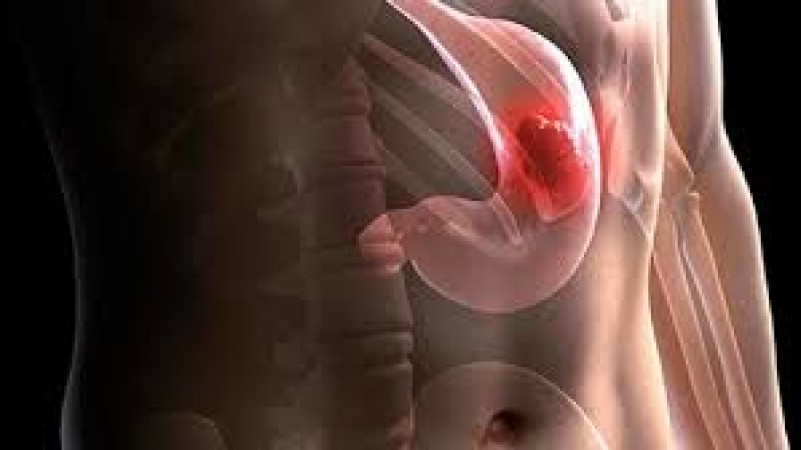
Stomach cancer, also known as gastric cancer, is a serious and often silent disease. It's crucial to catch it early for the best chance of successful treatment. Here are five key signs that you should never ignore.
Indigestion, or dyspepsia, is a common condition that many of us experience from time to time. It typically causes a feeling of discomfort or pain in the upper abdomen.
However, if you have persistent indigestion or heartburn that doesn’t go away with over-the-counter treatments, it could be a sign of something more serious, like stomach cancer.
Indigestion can often be dismissed as a minor issue, but when it’s chronic and severe, it’s your body’s way of signaling that something might be wrong. Don’t ignore persistent indigestion; consult your doctor.
Losing weight without trying might sound like a dream come true for some, but it’s a major red flag for potential health issues, including stomach cancer.
Unexplained weight loss is defined as losing 5% or more of your body weight over a 6-12 month period without dieting or increasing physical activity.
Stomach cancer can interfere with digestion and absorption of nutrients, leading to significant weight loss. If you notice your clothes getting looser and you haven’t made changes to your diet or exercise routine, see a doctor.
Early satiety is when you feel full after eating only a small amount of food. This can be a distressing and puzzling symptom.
A tumor in the stomach can create a physical obstruction or affect the stomach’s capacity, causing you to feel full more quickly than usual.
If you consistently feel full after eating very little, it’s worth getting checked out. This symptom can lead to malnutrition and significant weight loss.
Everyone experiences nausea at some point. But when nausea and vomiting become frequent or severe, it’s a sign that something isn’t right.
Stomach cancer can cause obstruction of the stomach outlet, leading to nausea and vomiting. Sometimes, the vomit may contain blood, which is an even more urgent sign.
Persistent nausea and vomiting can lead to dehydration and electrolyte imbalances. These symptoms warrant a prompt visit to your healthcare provider.
Stomach pain can range from a dull ache to sharp, cramping pain. It’s essential to pay attention to persistent or worsening pain.
Tumors in the stomach can cause pain that worsens after eating. This pain can be constant or come and go.
If you have ongoing stomach pain, especially if it’s associated with any other symptoms on this list, don’t delay seeking medical advice.
Regular medical check-ups can help catch many conditions early, including stomach cancer. Don’t skip your annual physicals and discuss any new symptoms with your doctor.
Being proactive about your health can make a significant difference in early detection and treatment outcomes. Know your body and listen to it.
Certain factors can increase your risk of developing stomach cancer. These include a family history of the disease, smoking, a diet high in salty and smoked foods, and infection with Helicobacter pylori bacteria.
While some risk factors like family history can’t be changed, others can be managed. Quitting smoking, eating a balanced diet, and treating H. pylori infections can reduce your risk.
An upper endoscopy allows doctors to look inside your stomach with a thin, flexible tube with a camera on the end. This is one of the most effective ways to diagnose stomach cancer.
During an endoscopy, your doctor may take a small tissue sample (biopsy) from your stomach lining to test for cancer cells.
CT scans, PET scans, and other imaging tests can help determine the extent of the cancer and if it has spread.
Surgery to remove part or all of the stomach (gastrectomy) is often necessary in treating stomach cancer, depending on the stage and location of the tumor.
Chemotherapy uses drugs to kill cancer cells. It can be used before surgery (neoadjuvant therapy) to shrink the tumor or after surgery (adjuvant therapy) to kill any remaining cancer cells.
Radiation therapy uses high-energy rays to target and kill cancer cells. It is often used in combination with chemotherapy.
Targeted therapy involves drugs that specifically target cancer cell mechanisms. This treatment is typically used for advanced stomach cancer.
Living with stomach cancer can be challenging. Building a strong support system of family, friends, and healthcare professionals is crucial.
Nutrition can be a significant issue for those with stomach cancer. Working with a dietitian can help ensure you’re getting the nutrients you need.
Dealing with cancer can take a toll on your mental health. Don’t hesitate to seek counseling or join support groups to help manage emotional challenges.
Maintaining a healthy lifestyle by eating a balanced diet, exercising regularly, and avoiding tobacco can help reduce your risk of stomach cancer.
Being aware of the symptoms and seeking medical attention early can significantly improve your chances of successful treatment.
Regular visits to your healthcare provider for check-ups and discussing any new symptoms can lead to early detection and better outcomes. Stomach cancer is a serious condition, but early detection can make a significant difference. If you experience any of these five signs—persistent indigestion, unexplained weight loss, feeling full quickly, nausea and vomiting, or stomach pain—don’t wait. Consult your doctor immediately. Staying informed, being proactive about your health, and seeking prompt medical attention can save your life.
Such a magical forest of India, which glows at night!
These are the 3 most expensive bikes sold in India, the price is so much that you will buy Audi-BMW
Lemon Rice: Learn to make South Indian dish 'Lemon Rice' in easy steps